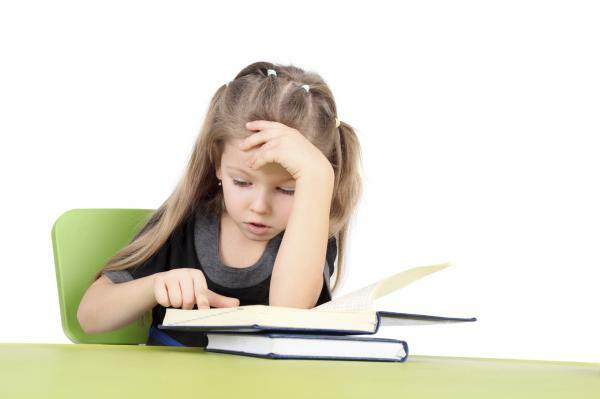
Parents usually expect their children to be able to integrate into different groups of children of the same age approximately, either at school or in extracurricular activities, and that thanks to this ease of integration they can have many friends. But sometimes what is expected does not happen, since there are children who have difficulties relating to other children their age, and this causes them anguish and a feeling of loneliness. We talk about it in this Psychology-Online article: why doesn't my son have friends.
Index
- My son has no friends at school
- Why does my son have no friends
- How to help your child make friends
My son has no friends at school.
Human beings, from the time we are born until we die, are considered as social beings by nature. For this reason, not having friends in childhood or having difficulty relating and making friends often causes emotional damage in children, for example, feeling of being rejected, feeling of loneliness, deterioration of the maturity process, family problems, depression or depressed mood, low self-esteem, violent behavior, among others. Therefore, having a good friendship circle makes it possible to have a greater emotional balance, favors personal development, helps to manage stress, improves self-esteem, and so on.
Because my son has no friends.
In this article we want to answer the question why doesn't my son have friends? that many fathers and mothers formulate. There are several possible reasons why a child does not have friends:
Bulling or bullying
In the first place, one of the reasons a child has no friends is bullying or bullying. It's about a physical and / or psychological harassment to which the child is subjected by their peers, a fact that causes him to feel rejected and develop fear and / or insecurity to make friends with other people outside of this harassment. For example, if the child is bullied at school and after a while moves to another city and goes to another school, the child may be afraid and is insecure when it comes to making friends with new classmates due to not wanting to relive the bad experience at school previous.
Behaviors that provoke rejection
Second, a child can be rejected by his peers, leading to a lack of friendships, for presenting inappropriate behaviors such as the following:
- Hostility and aggressiveness: refers to acting violently towards other people or living beings. When a child acts in this way it can cause peers to withdraw from him.
- Dominant personality: it is about those people who are dominant and authoritarian with respect to others, as if they were a leader. People with this type of personality, on many occasions, can harm others, due to their aggressive way of expressing themselves and determining what they want. So it is possible that the other children withdraw or reject the child with a dominant personality. In addition, among children, it is common for children with this type of personality to be called “bossy”, since they always want what they say to be done, hence the authority and dominance we discussed earlier.
- Accuse or defraud- Children who constantly accuse their peers or who disappoint them because of their actions or words may be rejected by their peers.
- Bad habits: on some occasions, the child may be rejected by his classmates due to habits that cause annoyance and offend others, such as For example, if the child turns out to be envious of others and always lets you know with offensive comments, if the child often complains a lot about unimportant things, if he always wants to be the center of attention and acts ridiculous and heavy, or when he is unable to accept criticism constructive. There may come a time when other children get tired of your repetitive offensive acts and reject you.
Lack of social skills
Third, the lack of social skills can also play a trick when it comes to interacting with others to try to establish friendships. Some of these social skills that make it difficult are:
- Shyness or embarrassment: it is a sensation that causes the child to be unable or have difficulties to start conversations, to face new situations and to relate to others.
- Lack of empathy and lack of sensitivity: people with a lack of empathy and sensitivity are incapable of putting themselves in the shoes of others, that is, they are incapable of feeling compassion and pity for others. For this reason, other children may reject the company of children with a lack of these skills. social, since by not having compassion for others, they can very easily damage the feelings of others kids. Here you can see how to work empathy in adolescents.
Unsafety: Sometimes children are insecure and unable to make new friends, be it because of embarrassment, shyness or fear. They are unable to approach other children to establish a conversation or relate to others and, therefore, they prefer not to try. Here you can see how to improve social skills in children.
The new technologies
Fourth, the acceleration of society and history implies a great growth of new technologies, a fact which can cause children to withdraw more into themselves and have no interest in relating physically to others kids.
Psychological trastorn
Finally, the fact of suffering from a psychological disorder can also be one of the reasons why a child does not have friends, either due to the stigmatization of the child. disorder, or because one of the symptoms that characterizes the disorder is linked to persistent deficiencies in social communication, such as the case of autism spectrum disorder.
How to help your child make friends.
How to help your child make friends? It depends on the reason. That is, depending on the causes that cause your child not to have friends, they should be helped in one way or another. Below we will mention some recommendations for each case:
In relation to bullying or bullying, it is common for children to make comments or give signals to try to tell us that they are being harassed at school, for example, “everyone they bother ”,“ my friends don't want to play with me ”,“ nobody wants to do work with me ”,“ they leave me alone in the yard and they don't want to play with me ”, etc. How can you help your child in this situation? Normally, what is recommended in these cases is communicate the situation to the school. Both the child's tutor and the principal have the duty to ensure the well-being of their students at school, therefore, they must attend to situations that prevent it. In case the school ignores the parents' communication, it can be reported to the center itself. In addition, if necessary, a specialist can be counted on to help the child with his low self-esteem, with his emotional exhaustion and other aspects caused by bullying.
Regarding the inappropriate behaviors and lack of social skills mentioned above, there are a number of recommendations for parents:
- Help your children realize of their attitudes and their repercussions, both the negative ones and the difficulties caused by the lack of social skills.
- Inform the school of the situation of their children so that they take into account how to treat them, for example, if a child is very embarrassing, that the teacher propose activities that involve talking with his classmates.
- If deemed necessary, go to an external professional to school that can help children control their actions and attitudes.
In reference to the individualism caused by the growth of new technologies, how can you help your child make friends? Parents are recommended limit the time of dedication to new technologies, that they propose to their children to carry out activities that involve leaving the house and interacting with other children (for example, going to the park), among others.
Finally, in relation to mental disorders, helping your child to make friends is crucial go to a specialist and keep the school informed, in order to carry out a network work that allows the child to be cared for from different areas of his life. Here we explain when is it to go to the child psychologist.
This article is merely informative, in Psychology-Online we do not have the power to make a diagnosis or recommend a treatment. We invite you to go to a psychologist to treat your particular case.
If you want to read more articles similar to Why does my son have no friends, we recommend that you enter our category of Socialization problems.
Bibliography
- Fuentes Rebollo, M. J., & Melero Zabal, M. (1992). Children's friendships: development, functions and intervention guidelines in school. Research at School Magazine, 16, 55-67.
- Orozco, C. M., Llanos, R. A., & García, O. S. (2003). Social networks: childhood, family and community. Northern University.


